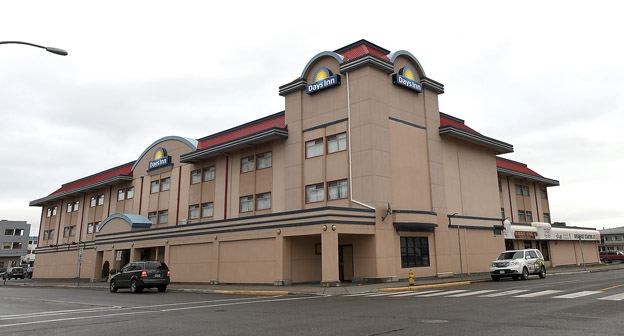The owners of the Treasure Cove Hotel have won a partial victory in a legal battle over a failed attempt to buy the Days Inn.
A B.C. Supreme Court Justice found Nishin Kanko Investments Ltd. breached a contract when it missed deadlines to discharge a mortgage on the property, located at the corner of Quebec Street and Seventh Avenue downtown.
However, Justice Ronald Skolrood also found Hoco Properties Inc. still has work to do in terms of proving the extent of damages.
Hoco had wanted to buy the property for $3.2 million by Feb. 28, 2014 and to continue to operate it as a hotel.
The plan was to renovate and refurbish the building and rebrand it as Holiday Inn Express in time for the 2015 Canada Winter Games.
When Nishin Kanko failed to meet the original deadline for discharging the mortgage, it was extended by agreement for a further month. But that deadline came and went as well.
According to Hoco principal Craig Briere, Hoco twice offered to extend the closing date on certain terms but those proposals were not accepted. By May 23, 2014, the mortgage was cleared and Nishin Kanko remained willing to sell the property.
But the sides were unable to agree on an appropriate holdback of the portion of the purchase amount to address the expenses and damages claimed by Hoco due to the delay.
Briere estimated those damages at $1 million and by the time the matter was before the court, Hoco was seeking $2.9 million.
Of that $2.2 million was in the form of "expectation damages" based on the difference between the purchase price plus the estimated cost of renovating and refurbishing the hotel and the property's expected market value once the work was completed.
In addition to buying the building for $3.2 million, Hoco planned to spend a further $6.2 million on the uprgrades for a total cost of $9.4 million. Based on a market study with operating projections and an "as completed" appraisal, the hotel's value was expected to reach $11.6 million once the work was completed, for a difference of $2.2 million.
But the evidence left Skolrood unconvinced and noted "the projected value provided in the study is described as a hypothetical valuation which relies on numerous assumptions" including a sizeable municipal property tax exemption.
Skolrood also found the study was not presented in court as a form of admissible evidence but rather simply as an amendment to an affidavit; was stamped as a draft copy and so did not purport to offer a definitive opinion on the value of the completed hotel; and was meant solely for for financing purposes and not for any other purpose.
Hoco was also seeking a further $711,055.03 plus GST for costs incurred in anticipation of the deal closing.
But once against, Skolrood found the evidence troublesome.
To support that claim a summary page and a stack of invoices was provided to the court but absent any explanation of how the invoices related to steps taken in anticipation of closing beyond a generic statement that "the documents demonstrate the costs incurred."
Moreover, Skolrood went on to provide a brief summary of the problems he encountered when he reviewed the documents and invoices.
However, Skolrood found Hoco likely suffered some loss although with damages still to be assessed.
As it turned out, the mortgage holder was living in the Phillippines and had died in 2010. Nishin Kanko claimed it was having trouble finding the holder, but according to a notice of application submitted by Hoco, the death certificate was signed by one of the holder's sons "who was and always was at all material times" a director of the Nishin Kanko, along with his brother.
Moreover, according to the notice, it was later admitted that the owner is a non-resident of Canada and therefore subject to a holdback under the Income Tax Act, and that Nishin Kanko subsequently abandoned a counterclaim in August 2014.
Also according to the notice, Hoco needed at least seven months and likely nine months to get the hotel ready for the Games.
In July 2015, Nishin Kanko sold the property to another party for $2.8 million, "representing a loss of $400,000 from the purchase price provided for in the agreement" according to a response to Hoco's notice of application.
Because Hoco was partially successful, Skolrood ordered Nishin Kanko to cover half of Hoco's legal costs.
Skolrood issued his reasons for judgment on October 13 and they were made public last week.



